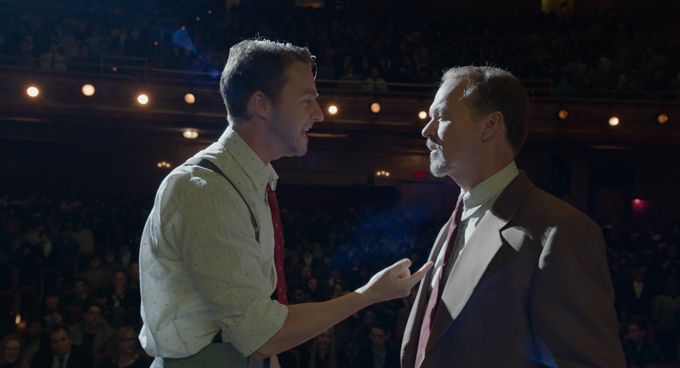 |
| Collider |
Michael Keaton is back, Edward Norton is better than ever, and Emma Stone can now be considered a serious actress by everyone who doubted her prowess. In Birdman, Alejandro González Iñárritu brings out some of the best performances of the year with his ingeniously subtle screenplay and his dedicated style of directing. His script follows around Hollywood actor Riggan Thomson, a forgotten star of yesterday, who is trying to re-launch himself into the public eye. Riggan attempts to adapt, direct, produce, and star in a Broadway adaptation, but struggles with family, affairs, critics, and a shadow of his former self - all of which are trying to squash his dreams of emerging out of a terribly inconvenient midlife crisis.
Riggan Thomsen is relentless. He won't stop. He yells at his daughter because he loves her. He drops equipment on the head of one of his actors because he wants the role to be played by someone better. He punches that actor's replacement in the face because he wants to keep him in line. He run through Manhattan in his underwear because he refuses to see his play fail. He begs a critic to give him a fair shake because he doesn't just want this comeback - he needs it.
Birdman is about reality. Even though its characters may be drug addicts, 80s celebrities, angry cynical critics, and alcoholic method actors, its characters carry an intriguing sense of relatability. Their struggles and their pains, though not always mirroring those of our own lives, are human. I don't know about you, but I had no idea what it was like to be a depressed former celebrity with an ex-wife, a mistress with a pregnancy-scare, and a daughter who's no stranger to rehab. But thanks to Birdman, I do now, because the movie never forgets to remind the audience that it is simply a view into Riggan's quest for redemption, and that's something almost everyone can relate to.
Iñárritu plunges his audience into Riggan's world. His characters are expertly constructed - we simultaneously root for and loathe Riggan, while we eagerly await the return of Edward Norton's Mike every time the camera pans away from him. Iñárritu had a vision for making this movie more than just a great screenplay, and with the skills of cinematographer Emmanuel Lubezki, Birdman's impact jumped from marvelous to historical. Following the cast throughout rooms, hallways, buildings, and massively mobbed city streets, the camerawork of Birdman is formatted in a way of making the viewer think the film is shot in one continuous take, and so when the cuts occur, you don't even notice it (which makes me wonder where this movie's Best Film Editing nomination is). Lubezki, winner of last year's Best Cinematography Oscar for Gravity, is in a pretty good position to get a second consecutive win. Equal credit goes out to the actors for not only going along with the experimental style, but embracing it.
I'll try to avoid labels in my wrap-up, as I don't think Riggan would appreciate them too much were he a real person. Birdman is both inventive and revolutionary. Few movies dare to reach for the ambition that Birdman achieved, and even less will live up to that expectation with the bar of originality, cinematography, and bluntness that the film has set. Although it drags at times, Birdman is an accomplishment on various levels of filmmaking, and earns its recognition.
Rating: 4.5/5
Rating: 4.5/5
No comments:
Post a Comment